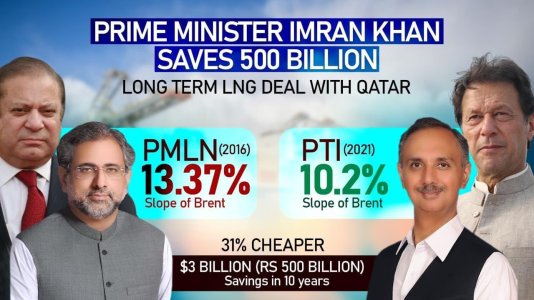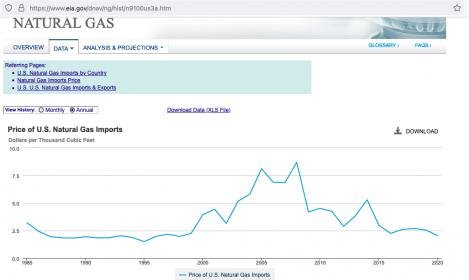- Joined
- Oct 2, 2004
- Runs
- 218,134
ISLAMABAD: Pakistan and Qatar have signed another long-term Liquefied Natural Gas (LNG) supply contract for additional 200 million cubic feet a day (MMCFD) at around 31 per cent lower rate than the 2015 contract for 500MMCFD.
The 10-year agreement signed on Friday entailed the “lowest-ever publicly disclosed price under a long-term contract in the world” and was achieved through joint efforts of the political and military leaderships, said Special Assistant to the Prime Minister on Petroleum Nadeem Babar while speaking at a news conference after the signing ceremony.
The Pakistan Tehreek-i-Insaf government had at the outset of its term tried to renegotiate the long-term contracts with Qatar signed by the Pakistan Muslim League-Nawaz government in 2015-16 with similar assertions that it had secured the lowest long-term price and no major LNG purchasers — much larger than Pakistan — had until then got such a price.
Qatar had plainly declined even to discuss the existing contract, saying it had dozens of similar long-term contracts with other countries and did not want to set a precedent, but had offered to provide 20-25pc price discounts for the additional 200MMCFD LNG supplies considering the close friendly relations between the two countries.
However, the offer did not materialise then, as Pakistan did not have a capacity beyond 100MMCFD additional quantities at the time and also due to a disagreement within the cabinet for political reasons.
PM’s aide says political, military efforts behind the lowest-ever publicly disclosed price in the world
Mr Babar told the presser that the supply under new Qatar deal would replace demand of the two existing and expiring long-term deals.
Under the new agreement, which will be effective from January 2022, Qatar will initially deliver two ships (containing a total of around 200MMCFD of LNG) a month. Later, the supplies will be enhanced up to four ships (400MMCFD) at the rate of 10.2pc of Brent.
In contrast, the first Pak-Qatar LNG contract had been signed for 15 years, beginning with 100MMCFD (one ship each month) and later going up to 500MMCFD (five ships a month) at the rate of 13.37pc of Brent.
The new contract has a price renegotiation option after four years rather than 10 years that had been fixed in the previously signed contract.
The PM’s aide said the total spot purchases as of December 2020 averaged at 11.90pc of Brent compared to 13.37pc of Brent in initial three long-term contracts signed about five years ago. The new Qatar price at 10.2pc of Brent is also 15-16pc lower than average spot purchases of 11.90pc of Brent and would ensure price stability and affordability along with supply security.
Based on the volume of the new contract, Pakistan would pay about $316 million lower cost when compared to the same volume under the existing contract, Mr Babar said. “In 10 years, this works out to be $3 billion,” he added.
“Pakistan is providing $170m letter of credit (LCs) under the past contract compared to $84m under the new contract, which is also almost half,” he said. Total supplies under the fresh contract could touch 3m tonnes compared to about 3.75m tonnes of contracted quantities.
He said the fresh supplies would replace the long-term contract of commodity trade Gunvor that expired in December last and another to would end in another 14 months. This way, he explained, the two new but cheaper shipments would replace the two expensive shipments of the past.
Mr Babar said the new contract would become operational in January 2022 but also provided for at least one additional ship in December this year if needed. He said Pakistan State Oil would import the LNG from Qatar under the new deal as well, but flexibility terms had been incorporated in the contract in case import order was to be assigned to Pakistan LNG Limited (PLL).
The PM’s aide recalled that talks with Qatar had been initiated about two years ago when Prime Minister Imran Khan had visited Doha for the first time and then had three more engagements with the Emir of Qatar.
Responding to a question, he said Pakistan’s military leadership also had dynamic relations with Qatar that had been facilitating talks between the United States and Taliban for peace in Afghanistan. He said both the military leadership and political leadership had the common interest to work in the larger interest of all and the deal was one such joint effort.
Earlier, Mr Khan witnessed the signing of the agreement by Minister for Energy Omar Ayub Khan and his visiting counterpart from Qatar Saad Sherida al-Kaabi.
Published in Dawn, February 27th, 2021
The 10-year agreement signed on Friday entailed the “lowest-ever publicly disclosed price under a long-term contract in the world” and was achieved through joint efforts of the political and military leaderships, said Special Assistant to the Prime Minister on Petroleum Nadeem Babar while speaking at a news conference after the signing ceremony.
The Pakistan Tehreek-i-Insaf government had at the outset of its term tried to renegotiate the long-term contracts with Qatar signed by the Pakistan Muslim League-Nawaz government in 2015-16 with similar assertions that it had secured the lowest long-term price and no major LNG purchasers — much larger than Pakistan — had until then got such a price.
Qatar had plainly declined even to discuss the existing contract, saying it had dozens of similar long-term contracts with other countries and did not want to set a precedent, but had offered to provide 20-25pc price discounts for the additional 200MMCFD LNG supplies considering the close friendly relations between the two countries.
However, the offer did not materialise then, as Pakistan did not have a capacity beyond 100MMCFD additional quantities at the time and also due to a disagreement within the cabinet for political reasons.
PM’s aide says political, military efforts behind the lowest-ever publicly disclosed price in the world
Mr Babar told the presser that the supply under new Qatar deal would replace demand of the two existing and expiring long-term deals.
Under the new agreement, which will be effective from January 2022, Qatar will initially deliver two ships (containing a total of around 200MMCFD of LNG) a month. Later, the supplies will be enhanced up to four ships (400MMCFD) at the rate of 10.2pc of Brent.
In contrast, the first Pak-Qatar LNG contract had been signed for 15 years, beginning with 100MMCFD (one ship each month) and later going up to 500MMCFD (five ships a month) at the rate of 13.37pc of Brent.
The new contract has a price renegotiation option after four years rather than 10 years that had been fixed in the previously signed contract.
The PM’s aide said the total spot purchases as of December 2020 averaged at 11.90pc of Brent compared to 13.37pc of Brent in initial three long-term contracts signed about five years ago. The new Qatar price at 10.2pc of Brent is also 15-16pc lower than average spot purchases of 11.90pc of Brent and would ensure price stability and affordability along with supply security.
Based on the volume of the new contract, Pakistan would pay about $316 million lower cost when compared to the same volume under the existing contract, Mr Babar said. “In 10 years, this works out to be $3 billion,” he added.
“Pakistan is providing $170m letter of credit (LCs) under the past contract compared to $84m under the new contract, which is also almost half,” he said. Total supplies under the fresh contract could touch 3m tonnes compared to about 3.75m tonnes of contracted quantities.
He said the fresh supplies would replace the long-term contract of commodity trade Gunvor that expired in December last and another to would end in another 14 months. This way, he explained, the two new but cheaper shipments would replace the two expensive shipments of the past.
Mr Babar said the new contract would become operational in January 2022 but also provided for at least one additional ship in December this year if needed. He said Pakistan State Oil would import the LNG from Qatar under the new deal as well, but flexibility terms had been incorporated in the contract in case import order was to be assigned to Pakistan LNG Limited (PLL).
The PM’s aide recalled that talks with Qatar had been initiated about two years ago when Prime Minister Imran Khan had visited Doha for the first time and then had three more engagements with the Emir of Qatar.
Responding to a question, he said Pakistan’s military leadership also had dynamic relations with Qatar that had been facilitating talks between the United States and Taliban for peace in Afghanistan. He said both the military leadership and political leadership had the common interest to work in the larger interest of all and the deal was one such joint effort.
Earlier, Mr Khan witnessed the signing of the agreement by Minister for Energy Omar Ayub Khan and his visiting counterpart from Qatar Saad Sherida al-Kaabi.
Published in Dawn, February 27th, 2021








